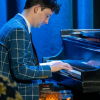Home » Jazz Articles » Album Review » Chris McCarthy: Add a Zero
Chris McCarthy: Add a Zero
Perhaps this is just an ornate way of saying, "The cat just makes everybody and everything on the bandstand sound better." But given the opportunity to play in a quintet setting, with a band that is a collective of unique voices, the notion is put to the test.
Add a Zero is much like his 2020 quintet release, Still Time to Quit (Ropeadope), not only for the titles reflecting McCarthy's sardonic view of the peril of being a professional jazz musician in the twenty-first century, but in his approach as a pianist to not overwhelm, to embrace the collective fellowship musically. He welcomes back trumpeter Takuya Kuroda and bassist Sam Minaie for the new recording, adding drummer Steven Crammer and baritone saxophonist Eden Bareket. There are stark differences to some degree compositionally, but the read and react aspects within the session reflect a high degree of familiarity between the fivesome. The compositions on the record are described by McCarthy in the liner notes as "one-pagers," simpler forms to enable improvisation, not heavily notated pieces that take away the identity of the player.
Bareket may be the most noticeable difference between the two quintet discs, not just in the fact that he is playing baritone, but in his unique approach to the instrument. This is heard on the opener 'Crunchy," one of six McCarthy originals on the album. Kuroda's rich trumpet sound, blended with Bareket's strong, yet subtle tones, creates a unique front line sound. McCarthy's solo, played within agile support from Crammer and Minaie is melodically impactful, a strength that is carried into his comping, where the melody seems to be everywhere without having an overwhelming presence. Bareket's technique and fearless forays into the upper register of the instrument set in motion a conversational dynamic balance between the five instruments that is many times difficult to achieve with a baritone player. The tune, and for that matter, the entire recording, is a reflective sounding board for the often genre-bending Kuroda, who has never sounded better on record.
"Tone Paintings" is a difference maker, beginning with McCarthy's simple vamp and Minaie's extended melodic entrance. The piece has a marvelous elasticity to it that facilitates luxurious long tones that in improvisation sound and feel like literal extensions of McCarthy's simple and tonally rich melody line. The pianist himself authors that notion to perfection when soloing, leaving harmonic fragments along the way for Bareket and Kuroda to latch onto. The title track melody is stated in bop-like fashion by the front line, placed on top of a rhythmic and harmonic base that is notably not boppish at all. Bareket and Kuroda improvise lines between McCarthy's dynamic, chordal subdivisions, defining what the pianist referred to as "one-pagers," short dynamic lines that are spacious. The same concept applies for "Budaboo," with Crammer upping the energy with orchestral cymbal work and subtle polyrhythms. Solos are short all around, with Bareket's leap into the altissimo range taking things over the top.
McCarthy has had the term "old soul" attached to him at times, perhaps in reaction to his work with Gould, who is often referred to similarly. In essence, it is a way of describing an artist who has a full understanding of the art form in which they are engaged. To be able to journey freely into the previously unknown, while having the wisdom and voice of the ages. The album's finale, a dive into the Ellington sacred classic, "Come Sunday," brings those notions front and center. The piece is shared in circular motion, beginning with bassist Minaie's introspective intro. When McCarthy joins with the master's gorgeous chordal harmony, the sharing circle begins, as if passing around a talisman of great spiritual strength. Again, Bareket fits in with a soft edge surrounding an intent of strength and melodic propulsion. One by one, the sacrament is passed, each time gaining strength and a stronger, plain expression of the blues.
McCarthy has unearthed a gem here, facilitated by musicians who understand his creative drive and with whom he feels a kindred spirit both musically and socially. Add A Zero answers the larger question about why one should compose, play, record and perform during difficult times in the industry. It is because before business and commodification, music is holy, and that is where the contribution to humanity looms large.
Track Listing
Crunchy; No Breakfast; Tone Paintings; Add a Zero; Very Soon; Depressed to Impress; Buddaboo; Come Sunday.
Personnel
Chris McCarthy
pianoTakuya Kuroda
trumpetEden Bareket
saxophone, baritoneSam Minaie
bassSteven Crammer
drumsAlbum information
Title: Add a Zero | Year Released: 2025 | Record Label: Fresh Sound Records
Tags
PREVIOUS / NEXT
Support All About Jazz
 All About Jazz has been a pillar of jazz since 1995, championing it as an art form and, more importantly, supporting the musicians who make it. Our enduring commitment has made "AAJ" one of the most culturally important websites of its kind, read by hundreds of thousands of fans, musicians and industry figures every month.
All About Jazz has been a pillar of jazz since 1995, championing it as an art form and, more importantly, supporting the musicians who make it. Our enduring commitment has made "AAJ" one of the most culturally important websites of its kind, read by hundreds of thousands of fans, musicians and industry figures every month.
























